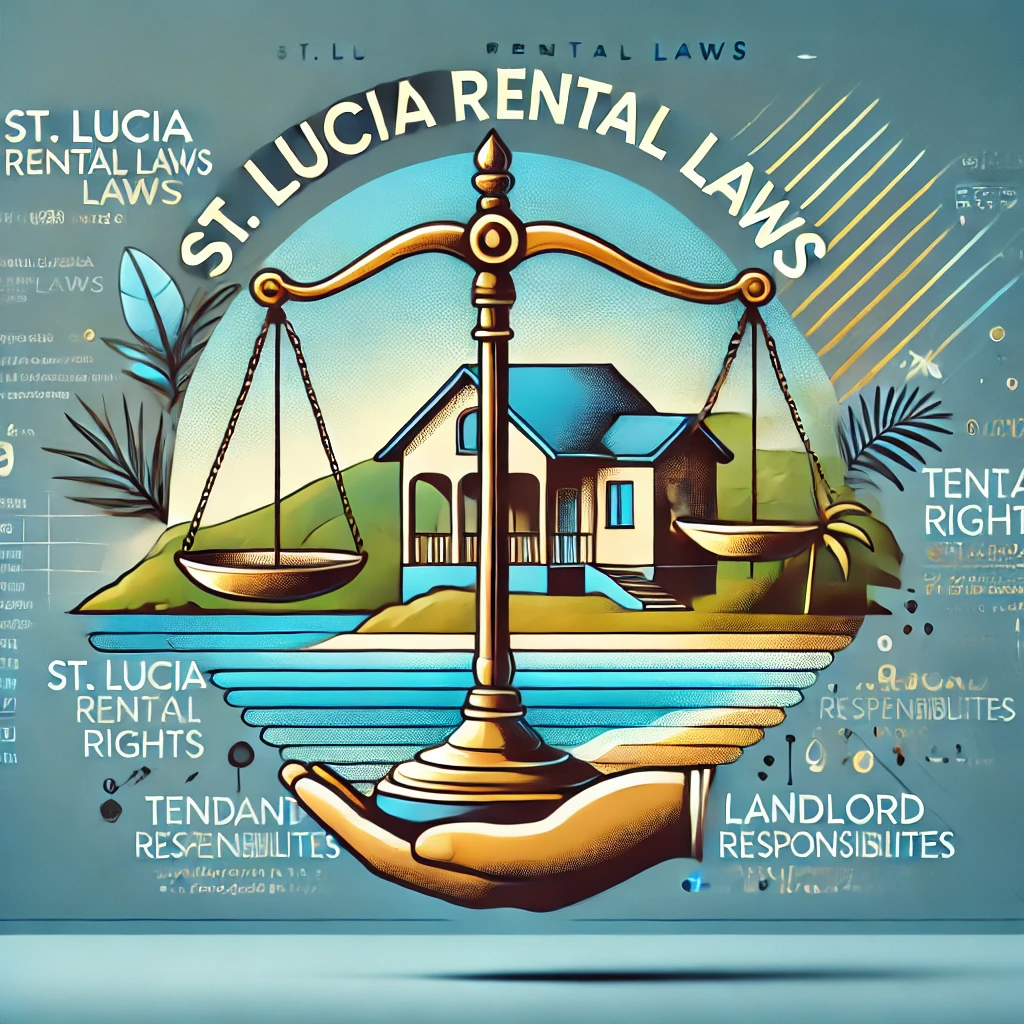A Comprehensive Guide to Rental Laws in St. Lucia
St. Lucia’s rental laws provide a framework for fair and equitable relationships between landlords and tenants. They aim to balance the rights and responsibilities of both parties while ensuring property rental practices align with national legal standards. Below is an in-depth exploration of the key aspects of St. Lucia’s rental laws.
1. Legal Foundation of Rental Agreements
The foundation of any rental arrangement in St. Lucia is the lease agreement, which can be written or oral. While oral agreements are legally binding, written agreements are highly recommended as they provide clear documentation of the terms and conditions, minimizing disputes.
A typical lease agreement in St. Lucia includes:
- Identification of Parties: The names and contact details of the landlord and tenant.
- Property Details: Description of the rental property.
- Lease Term: The duration of the lease, whether fixed-term or periodic.
- Rent Amount and Payment Terms: The agreed-upon rent, due dates, and acceptable payment methods.
- Deposits: Security deposits are standard practice, often equivalent to one month’s rent, to cover damages or unpaid rent at the end of the tenancy.
2. Tenant Rights
Tenants in St. Lucia are protected under laws that ensure they have secure and habitable living conditions. Key rights include:
- Right to Quiet Enjoyment: Tenants have the right to use the property without interference from the landlord, as long as they comply with the terms of the lease.
- Right to Fair Treatment: Tenants cannot be discriminated against based on race, gender, religion, or other personal characteristics.
- Right to Notice: Before a landlord enters the rental property, they must provide reasonable notice, except in emergencies.
- Right to a Habitable Property: Landlords are required to maintain the property in a condition that meets basic health and safety standards.
3. Landlord Rights and Responsibilities
Landlords also have specific rights and duties under St. Lucia’s rental laws. These include:
- Right to Receive Rent: Landlords are entitled to timely payment of rent as outlined in the lease.
- Right to Recover Property: At the end of the lease term or if a tenant breaches the agreement, landlords can reclaim their property, following due legal process.
- Obligation to Maintain the Property: Landlords must ensure the property is free from hazards and remains habitable.
- Adherence to Termination Procedures: Evictions must follow legal protocols to ensure they are not deemed arbitrary or illegal.
4. Security Deposits
Security deposits serve as a financial safeguard for landlords. In St. Lucia, security deposits are commonly used but are subject to specific rules:
- Amount: Typically equivalent to one month’s rent, although landlords may negotiate other amounts.
- Usage: Deposits can only be used for unpaid rent, damages beyond normal wear and tear, or cleaning costs at the end of the tenancy.
- Return of Deposit: Landlords are required to return the security deposit within a reasonable timeframe after the tenant vacates the property, minus any legitimate deductions.
5. Rent Regulations
Rental prices in St. Lucia are generally determined by market forces; however, certain regulations ensure fairness:
- Rent Increases: Increases in rent must comply with the lease terms or be agreed upon in writing by both parties.
- Non-Payment of Rent: If a tenant fails to pay rent, landlords must follow legal processes to recover arrears or terminate the lease.
6. Repairs and Maintenance
Responsibilities for property upkeep are shared between landlords and tenants:
- Landlord Responsibilities: Structural repairs, electrical and plumbing maintenance, and ensuring the property meets health and safety standards.
- Tenant Responsibilities: Minor repairs, maintaining cleanliness, and reporting damages promptly to the landlord.
7. Termination of Lease
Leases may end for various reasons, including:
- Expiration: At the end of a fixed-term lease, the agreement concludes unless both parties agree to renew.
- Mutual Agreement: Landlords and tenants can agree to terminate a lease before its expiration.
- Tenant Breach: Failure to pay rent or violation of lease terms can lead to termination.
- Eviction: Landlords must issue formal notices and, if necessary, seek a court order to evict tenants.
8. Dispute Resolution
Disputes between landlords and tenants are not uncommon. In St. Lucia, such disputes are typically resolved through:
- Negotiation: Many issues can be resolved amicably without legal intervention.
- Mediation: Third-party mediators can help parties reach a mutually acceptable solution.
- Legal Proceedings: For unresolved disputes, the matter can be taken to court, where a judge will issue a binding decision.
9. Legal Protections Against Arbitrary Evictions
Evictions in St. Lucia are heavily regulated to protect tenants from arbitrary or unfair treatment. The landlord must:
- Provide written notice stating the reasons for eviction.
- Allow the tenant reasonable time to vacate, as specified by law.
- Obtain a court order if the tenant refuses to leave after the notice period.
10. Governing Bodies and Resources
Rental laws in St. Lucia are enforced by the judicial system and relevant government bodies, such as:
- The Attorney General’s Chambers: Provides access to legal statutes and information on property and rental laws.
- Local Magistrates’ Courts: Handle disputes and eviction cases.
Tips for Landlords and Tenants
For both parties, adhering to the legal framework ensures a smooth rental experience:
- For Tenants: Always insist on a written lease and keep records of payments and correspondence with the landlord.
- For Landlords: Ensure leases comply with legal standards and address potential issues proactively.
St. Lucia’s rental laws are designed to foster a fair rental market, providing stability for tenants and landlords. By understanding these laws and seeking proper legal advice when necessary, both parties can confidently navigate the rental process. To explore detailed legal texts, visit the Attorney General’s Chambers.




